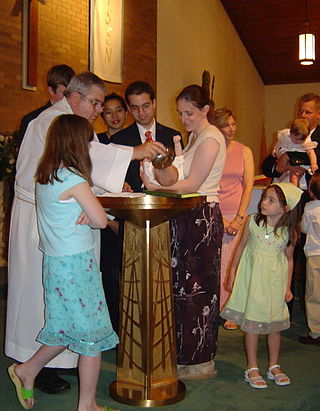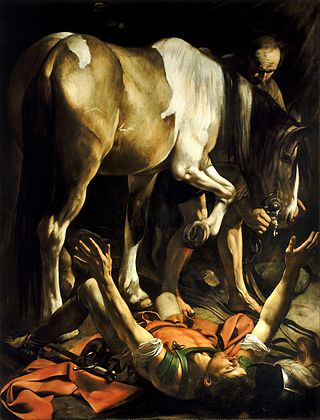Baptists form a major branch of Protestantism distinguished by baptizing only professing Christian believers, and doing so by complete immersion. Baptist churches also generally subscribe to the doctrines of soul competency, sola fide, sola scriptura and congregationalist church government. Baptists generally recognize two ordinances: baptism and communion.

Baptism is a Christian sacrament of initiation and adoption, almost invariably with the use of water. It may be performed by sprinkling or pouring water on the head, or by immersing in water either partially or completely, traditionally three times, once for each person of the Trinity. The synoptic gospels recount that John the Baptist baptised Jesus. Baptism is considered a sacrament in most churches, and as an ordinance in others. Baptism according to the Trinitarian formula, which is done in most mainstream Christian denominations, is seen as being a basis for Christian ecumenism, the concept of unity amongst Christians. Baptism is also called christening, although some reserve the word "christening" for the baptism of infants. In certain Christian denominations, such as the Catholic Churches, Eastern Orthodox Churches, Oriental Orthodox Churches, Assyrian Church of the East, and Lutheran Churches, baptism is the door to church membership, with candidates taking baptismal vows. It has also given its name to the Baptist churches and denominations.
Born again, or to experience the new birth, is a phrase, particularly in evangelicalism, that refers to a "spiritual rebirth", or a regeneration of the human spirit. In contrast to one's physical birth, being "born again" is distinctly and separately caused by the operation of the Holy Spirit, and it is not caused by baptism in water. It is a core doctrine of the denominations of the Anabaptist, Moravian, Methodist, Baptist, Plymouth Brethren and Pentecostal Churches along with all other evangelical Christian denominations. All of these Churches strongly believe Jesus's words in the Gospels: "You must be born again before you can see, or enter, the Kingdom of Heaven." Their doctrines also mandate that to be both "born again" and "saved", one must have a personal and intimate relationship with Jesus Christ.

Infant baptism is the practice of baptising infants or young children. Infant baptism is also called christening by some faith traditions.
Religious conversion is the adoption of a set of beliefs identified with one particular religious denomination to the exclusion of others. Thus "religious conversion" would describe the abandoning of adherence to one denomination and affiliating with another. This might be from one to another denomination within the same religion, for example, from Protestant Christianity to Roman Catholicism or from Sunnī Islam to Shīʿa Islam. In some cases, religious conversion "marks a transformation of religious identity and is symbolized by special rituals".

In Christian denominations that practice infant baptism, confirmation is seen as the sealing of the covenant created in baptism. Those being confirmed are known as confirmands. For adults, it is an affirmation of belief. It involves laying on of hands.
The Latin phrase extra Ecclesiam nulla salus is a phrase referring to a Christian doctrine about who is to receive salvation.

A catechism is a summary or exposition of doctrine and serves as a learning introduction to the Sacraments traditionally used in catechesis, or Christian religious teaching of children and adult converts. Catechisms are doctrinal manuals – often in the form of questions followed by answers to be memorised – a format that has been used in non-religious or secular contexts as well. According to Norman DeWitt, the early Christians appropriated this practice from the Epicureans, a school whose founder Epicurus had instructed to keep summaries of the teachings for easy learning. The term catechumen refers to the designated recipient of the catechetical work or instruction. In the Catholic Church, catechumens are those who are preparing to receive the Sacrament of Baptism. Traditionally, they would be placed separately during Holy Mass from those who had been baptized, and would be dismissed from the liturgical assembly before the Profession of Faith and General Intercessions.
In religious organizations, the laity consists of all members who are not part of the clergy, usually including any non-ordained members of religious orders, e.g. a nun or a lay brother.

A parody religion or mock religion is a belief system that challenges the spiritual convictions of others, often through humor, satire, or burlesque. Often constructed to achieve a specific purpose related to another belief system, a parody religion can be a parody of several religions, sects, gurus, cults, or new religious movements at the same time, or even a parody of no particular religion – instead parodying the concept of religious belief itself. Some parody religions emphasise having fun; the new faith may serve as a convenient excuse for pleasant social interaction among the like-minded.

Catechesis is basic Christian religious education of children and adults, often from a catechism book. It started as education of converts to Christianity, but as the religion became institutionalized, catechesis was used for education of members who had been baptized as infants. As defined in the Catechism of the Catholic Church, paragraph 5 :
Catechesis is an education in the faith of children, young people and adults which includes especially the teaching of Christian doctrine imparted, generally speaking, in an organic and systematic way, with a view to initiating the hearers into the fullness of Christian life.

Conversion to Christianity is the religious conversion of a previously non-Christian person to Christianity. Different Christian denominations may perform various different kinds of rituals or ceremonies of initiation into their community of believers. The most commonly accepted ritual of conversion in Christianity is through baptism, but this is not universally accepted among them all. A period of instruction and study almost always ensues before a person is formally converted into Christianity and becomes a church member, but the length of this period varies, sometimes as short as a few weeks and possibly less, and other times, up to as long as a year or possibly more.

The Mass is the central liturgical service of the Eucharist in the Catholic Church, in which bread and wine are consecrated and become the body and blood of Christ. As defined by the Church at the Council of Trent, in the Mass "the same Christ who offered himself once in a bloody manner on the altar of the cross, is present and offered in an unbloody manner". The Church describes the Mass as the "source and summit of the Christian life", and teaches that the Mass is a sacrifice, in which the sacramental bread and wine, through consecration by an ordained priest, become the sacrificial body, blood, soul, and divinity of Christ as the sacrifice on Calvary made truly present once again on the altar. The Catholic Church permits only baptised members in the state of grace to receive Christ in the Eucharist.

The National Catholic Educational Association (NCEA) is a private, professional educational membership association of over 150,000 educators in Catholic schools, universities, and religious education programs. It is the largest such organization in the world.

The Catholic branch of Christianity is the predominant religion in Malta. The Constitution of Malta establishes Catholicism as the state religion, and it is also reflected in various elements of Maltese culture. According to a 2018 survey, the overwhelming majority of the Maltese population adheres to Christianity (95.2%) with Catholicism as the main denomination (93.9%). According to a Eurobarometer survey conducted in 2019, 83% of the population identified as Catholic. Similarly, the 2021 census of the population found that 82.6% belonged to the Catholic church.

Religion in Scouting and Guiding is an aspect of the Scout method that has been practiced differently and given different interpretations in different parts of the world over the years.

Christianity is the predominant religion in Uganda. According to the 2014 census, over 84 percent of the population was Christian, while about 14 percent of the population adhered to Islam, making it the largest minority religion. Anglicanism and Catholicism are the main Christian denominations in the country.

Lent is the solemn Christian religious observance in the liturgical year commemorating the 40 days Jesus Christ spent fasting in the desert and enduring temptation by Satan, according to the Gospels of Matthew, Mark and Luke, before beginning his public ministry. Lent is observed in the Anglican, Eastern Orthodox, Lutheran, Methodist, Moravian, Oriental Orthodox, Church of the East, United Protestant and Roman Catholic traditions of Christianity. Some Anabaptist, Baptist, Reformed, and nondenominational Christian churches also observe Lent, although many churches in these traditions do not.

The Oriental Orthodox Churches are Eastern Christian churches adhering to Miaphysite Christology, with approximately 60 million members worldwide. The Oriental Orthodox Churches are part of the Nicene Christian tradition, and represent one of its oldest branches.

The Order of Christian Initiation of Adults (OCIA), or Ordo Initiationis Christianae Adultorum, is a process developed by the Catholic Church for its catechumenate for prospective converts to the Catholic faith above the age of infant baptism. Candidates are gradually introduced to aspects of Catholic beliefs and practices. The basic process applies to adults and children who have reached catechetical age. Previously, the Order of Christian Initiation of Adults was known as the Rite of Christian Initiation of Adults (RCIA). The name was changed in 2021 to reflect greater fidelity to the original Latin.













